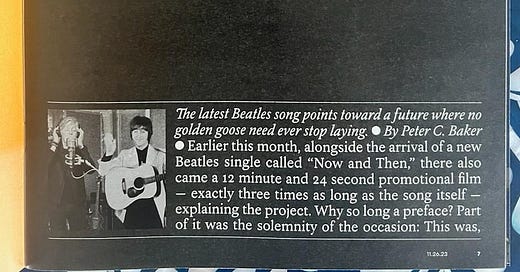Hi all,
I've been off Twitter the last few months, in part because it feels less fun than it used to, in part as an attempt to make room in my head/day for a new novel while raising two small kids. I'm mostly enjoying this change, but I do still miss some of the interactions, and the forum for sharing my writing. So I'm going to try––he said for the umpteenth time––to start sending these dispatches out more often, in hopes of connecting with you all more often. If you know anyone who might enjoy my writing or appreciate these updates, please forward this to them and encourage them to subscribe.
I wrote about "Now and Then," the "new" "Beatles" single, made possible by advances in Artificial Intelligence, for last weekend's New York Times Magazine. You can also read it online.
I love The Beatles (more on which below), but my take on the song is skeptical: I didn't much like it as a piece of music, and––more importantly––it made me worried about the future of cultural production, and the threat of endlessly ballooning rehash culture.
The Beatles were the first band I loved. In many ways, my Beatles fandom set the template for my musical attachments going forward. It wasn't just that I liked the songs (it's never just about liking the songs, is it?). It was also that I liked a story I felt flowing behind and between the songs, from album to album. A story that was partially the story of each of these four men, and partially the story of their time together. It was also something bigger, not a story but a shape where other stories could go. The songs could become part of your life, and when they did, your life became part of this bigger thing, The Beatles.
I caught my personal case of Beatlemania as a result of the "Anthology" series of television documentaries and archival albums, released in the Nineties, when I was in junior high. That was when I started buying their albums, first on cassettes, then on CD. In seventh or eighth grade, three friends and I were The Beatles for Halloween (as I recall, this basically involved not much more than wearing dark suits and singing the opening lines of "Can't Buy Me Love" while holding out our candy bags). I read books about the band, and the books told me what to listen to next: who influenced them, who they influenced, who they competed with, the worlds they lived in, the culture they shaped. It was because of these books that I listened to the Beach Boys for the first time. And Chuck Berry. And the Rolling Stones. And so on.
What's the story? How does it relate to other stories? The stories of other bands, of genres, of the broader culture, of history? How does it relate to me, to my story? What is my story? This is still how I think about music, especially when I'm writing about it.
Listening to "Now and Then," the story––the intertwining stories––felt ... not so good. So that's what I wrote about.
In the comments, lots of readers share their more positive experiences. They talk about the song reconnecting them to treasured, Beatles-inflected memories: to the past, to their past selves, to the flow of time. They love the Beatles, and loved the sense of hearing from them again, despite the barriers of time and death.
I didn't have space in the piece to get into my own deep Beatles love, which remains undented by "Now and Then". And I suppose that's why I've written it down here.
More soon,
--Peter
PS -- My novel, Planes, remains available in paperback, small and light enough for a stocking. If you'd like to gift someone a signed copy, let me know and I'll mail you an adhesive bookplate with my signature.


